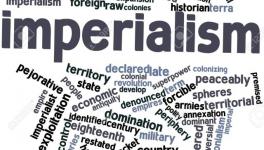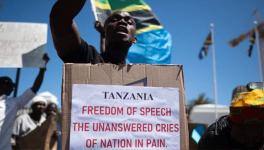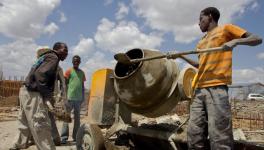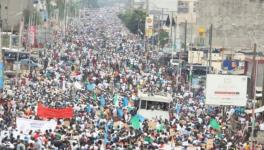Upheaval Begins in Africa but Expect More Cataclysms
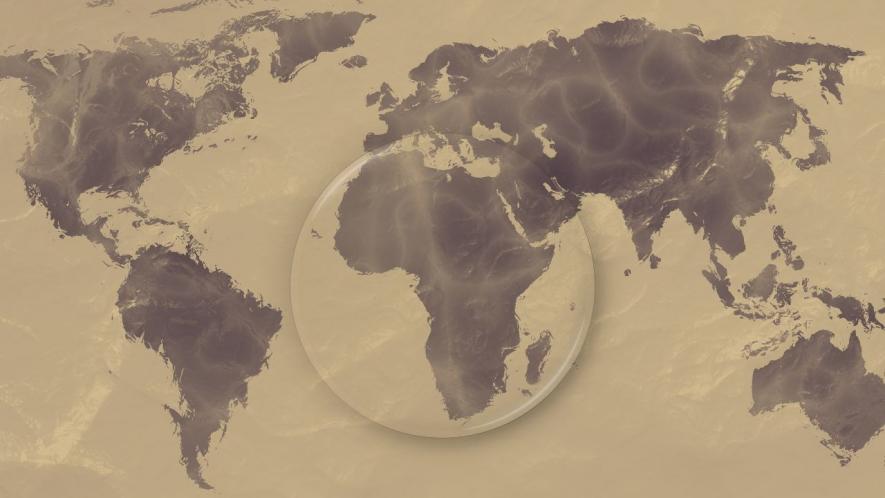
Africa, the second largest, mineral-rich, but extremely impoverished continent, rarely features in the news. Western historians mostly shun mentioning the atrocious excesses of the European colonial powers upon Africans. The barbarity of King Leopold of Belgium, the ruthlessness with which the British crushed the Mau Mau movement in Kenya, the atrocious role of the Belgians—with the fingerprints of the CIA—in slaughtering Patrice Lumumba who wanted to nationalise his country’s mineral wealth, the ousting of Ghana’s father of the nation, Kwame Nkrumah, the assassination of Burkina Faso’s leader Thomas Sankara and, lately, the gory crime of assassinating Muammar Gaddafi in cold blood by NATO—the armed wing of the metropolitan capital—have convulsed the entire African continent.
Lumumba, Nkrumah, and Sankara were Marxists, a crime big enough to be tolerated by the leading apostles of democracy of the world. Even “lesser criminals” like Gaddafi who wanted to overthrow the yoke of slavery, were finally conquered when, despite yielding to the imperialist’s designs by giving up their nuclear ambitions, tried to forge a common African currency. The Libyan government not only possessed massive gold reserves and the best quality of oil but also had immense freshwater resources eyed greedily by United States multinationals.
Despite the tragic tales, Africans have refused to take it tragically. As DH Lawrence suggests, “The cataclysm has happened, we are among the ruins,” but “We’ve got to live no matter how many skies fall.” The centuries-old history of the European colonialism of Africa, which began in 1884 during the Berlin Conference, is coming to its logical end. In the absence of any African country, the democratic imperialist powers sliced the continent and divided the exploits among themselves. France took control of the northern, western, and parts of central African territories, while the British occupied the southern and eastern parts. United Africa, run by various monarchies, was divided into multiple countries. Their languages were snatched, and they were forced to speak the colonisers’ language.
The movements of self-determination started immediately after the Second European War when Britain and France—the imperialist forces—were exhausted by their two costly wars. French president General Charles de Gaulle offered the French-occupied colonies to become either a part of the French Union or to choose independence, fully confident that no colony would dare to select the latter path. However, Guinea, one of the countries of Sahel, rejected the offer and, after holding a referendum under the leadership of Ahmed Sekou Touré, embraced liberation.
The arrogant French colonists took off their civilised veil and brazenly destroyed everything from electricity bulbs to hospital equipment to infrastructure. It was a rampage. Akin to the United States, France imposed sanctions upon Guinea, leaving its economy in shambles. During those terrible times, the Soviets—eternal flag-bearers of international freedom—came to the rescue. The message of France was loud and clear: if any other African colony tried to emulate the nonconformity of Guinea, it was to be smashed to smithereens.
Nevertheless, the lesson put forward by the colonial empire remained unheeded. Rather than extinguishing, the flame of freedom spread throughout the continent and by 1960, nearly all French colonies had overthrown the yoke of slavery. However, freedom lacking economic content was merely political freedom. The freedom to choose native black leaders subservient to the colonial masters proved both a tragedy and a farce. For the façade of liberation, what were the terms of endearment?
France imposed the CFA Franc, a currency created in 1945 by De Gaulle through a decree in 14 former colonies, which included eight West African and six central African states. The currency still determining the economic fate of these countries has a fixed exchange rate with the Euro. France can convert unlimited numbers of colonial Francs into Euros because every colonised country must keep 50% of its foreign exchange reserve in the operating account of the French treasury. Even this breathing space is recent, won in 2005. From 1973 to 2005, the amount was as high as 65%, while at the time of independence, it was 100%. There is no free lunch in capitalism, but France lavishes itself while robbing food from the poorest of the world’s poor.
France invests its stolen money into the international market and earns 300-500 billion dollars annually. If that isn’t enough, France continues to grab minerals, which could not be sold to any country but France and on its terms. The neo-colonised countries cannot form any military alliance within the African continent or the rest of the world. Despite their riches, these are the poorest countries in the world. Niger, for instance, is the fourth-largest producer of uranium and has the fifth-largest high-quality uranium ore deposits. It contributes 15% of the uranium requirements of France, and some sources claim that every one of three electric bulbs in France owes its light to Niger’s uranium. It is the second-biggest exporter to France after Kazakhstan, but out of its 22.4 million [2.24 crore] population, 42% live in absolute poverty and without electricity.
The conditions in other neo-colonised states are similar. Burkina Faso produces large quantities of gold, zinc, copper, magnesium and limestone. Its 17 industrial mines produce nearly 70 tonnes of gold every year. It may be Africa’s fourth-largest gold-producing country, but SEMAFO, a Canadian company, controls 90% of the gold. Recently, the government has given a four-year gold exploration licence to Nord Gold, a Russian company mining gold in the north of the country, the area under Islamic insurgency.
Mali is not only rich in gold but produces plenty of diamonds, bauxite, zinc, and lithium; the list goes on and on. The gold is mined by Barrick Gold Corporation, headquartered in Canada, which robs the state of 80% of its gold.
On one hand, France is plundering the African economy directly and allegedly by supporting Islamic fundamentalism. Conversely, Western mining companies are making hay with Africans’ mineral wealth. Ever since France and the United States walked into Africa to counter al Qaeda and its subsidiaries, religious fundamentalism has peaked.
This resource robbery is occurring with the connivance of the democratically-elected puppets or military dictators that rule these countries and continue to oppress their people. The situation has called for volcanic solutions. The restlessness among the masses and the absence of Marxist forces during the changing geopolitical situation did not mean the void had to keep gaping. Nationalist elements in the army have moved in to fill the void.
From Guinea to Mali and Burkina Faso to Niger, in the entire Sahel region, lower-ranking officers have taken over the reins of power. It is a repeat of Egypt, Syria and Iraq, where in the 1960s, the Free Officers took the western world by surprise.
Leave aside the Western model of democracy, a fetishised tool to suppress even the remotest possibility of progressive development. Here, the question is also not about the intentions of these coup leaders but the execution of their objectives when the material conditions to build some kind of socialism or state capitalism, to which Ibrahim Traore of Burkina Faso has alluded, are absent. The possibility of a United States-sponsored counter-coup cannot be ruled out.
After all, Sankara, the most popular president in all of Africa, was mercilessly killed by Brutus, his close friend who played the hideous part on the snapping of the fingers of the CIA.
ECOWAS, a Western poodle, is already hounding Niger leaders, threatening to unleash the dogs of war on them. What complicates the situation for the coup leaders is the presence of French and United States troops and a military base worth $100 million in Niger.
However, the Niger junta may heave a sigh of relief because, by the time this article is published, the fate of oil-rich Gabon will also have been decided. The military coup against Ali Bongo—a French puppet running a dynastic rule for 57 years—is in process there.
The alliance and unity among coup leaders of the four countries and backing from Algeria are hopeful signs, but the battle is protracted. Ever since the Niger coup leader snubbed Victoria Nuland, the architect of the Maidan Square revolt, the United States has been ready to ditch France.
“The American ideology,” Samir Amin says, is based on “unmitigated economic liberalism, masked by a para-religious discourse and packaged with insipid rhetoric about democracy.” It is “led by a war criminal Junta that took power through a kind of coup that may be preceded by (dubious) elections…but Hitler also came to power through elections”.
The United States has dispatched its European allies into the inferno of recession, destroying the Nordstream-2 pipeline and depriving them of a source of cheap energy. It forced Australia to give up its pact with France to buy the nuke-headed submarines from American multinationals and sent Ukraine into a war of annihilation. The United States is no one’s friend but a rogue state vying to lead humanity into a third world war.
However, there is hope. The new alignment of forces is taking place. The Russia-China (BRICS-plus) bloc is opening another vista for humankind to respond to the imperialist domination of the West. A wind of change blowing does not mean change is around the corner. Let us wait for it with bated breath, but not fingers crossed. Men make history, as Marx said, not in ideal situations but in the conditions given to them.
The writer is an Australia-based academic and has authored books on socialism and history. The views are personal.
Get the latest reports & analysis with people's perspective on Protests, movements & deep analytical videos, discussions of the current affairs in your Telegram app. Subscribe to NewsClick's Telegram channel & get Real-Time updates on stories, as they get published on our website.










